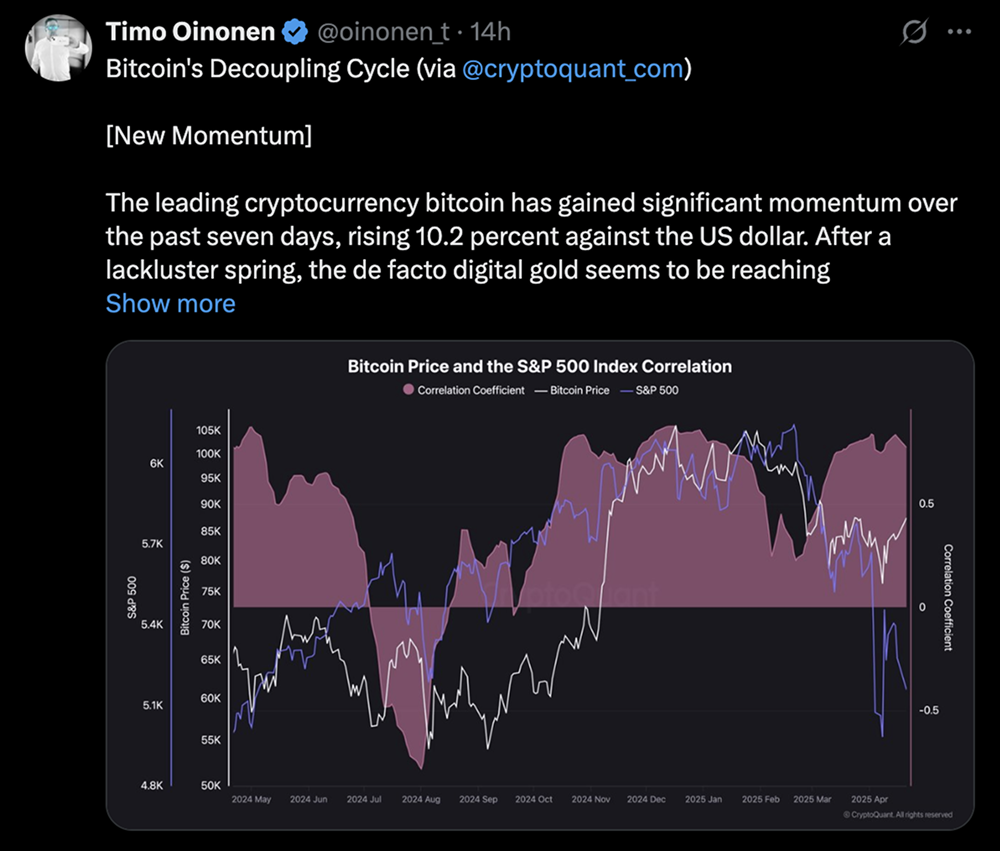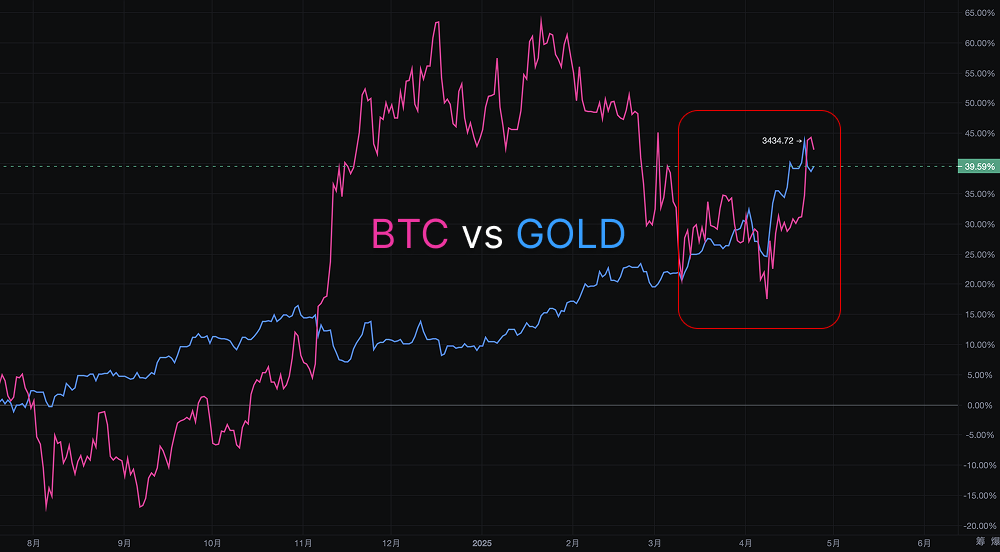
脱钩趋势:从同步到分化
过去几年,比特币与美股(尤其是科技股驱动的纳斯达克指数)表现出高度相关性,特别是在2021-2022年的牛市和熊市周期中。机构投资者的涌入、加密ETF的推出以及宏观经济环境的变化,比特币一度被视为“风险资产”,与美股同涨同跌。然而,2025年春季以来,这一同步性显著减弱。据《界面新闻》4月15日报道,比特币与纳斯达克的30日滚动相关性在2024年3月已降至五年低点0.46,而近期虽略有回升,仍远低于历史高位。
《财联社》4月21日进一步指出,比特币在美股回调期间逆势上涨,显示出与传统市场的独立性。X平台上的市场观察者@cryptomayflower也在4月23日发帖称,比特币与美股的持续脱钩可能是其作为“独立资产类别”的转折点,尤其是在美元指数下跌、美股承压的背景下,比特币与黄金的相关性正在上升。 这一趋势与ARK Invest在2025年2月发布的《2025年大创意》报告相呼应,该报告强调比特币2024年波动率降至历史低点(年化波动率低于50%),使其风险特征更接近避险资产而非投机资产。

驱动因素:宏观环境与政策预期
比特币脱钩的背后,宏观经济和政策变化起到关键作用。首先,全球经济的不确定性加剧推动了避险需求。2025年4月,《腾讯新闻》援引Bitcoin Magazine Pro的分析称,关税战、美债收益率上升以及企业盈利疲软导致股票市场波动加剧,而比特币因其去中心化属性,吸引了寻求避险的资金流入。 X用户@biteshizhe也在4月23日发帖指出,经济衰退担忧叠加美债风险,可能推动比特币成为“数字黄金2.0”。
其次,政策层面的乐观预期也在支撑比特币的独立行情。《投资慧眼Insights》4月10日报道,美国多州响应“打造比特币战略储备”的倡议,叠加SEC对加密监管的潜在宽松信号,增强了市场信心。 特朗普政府上台后,其竞选期间承诺的“放松加密监管”和“建立比特币储备”政策逐步落地,进一步提振了投资者对加密资产的长期预期。
市场信号:机会与风险并存
比特币的脱钩是否标志着其进入新的资产周期?权威媒体对此观点不一。《新浪财经》4月20日分析称,比特币在风险偏好高涨时与美股趋同,但在市场恐慌时可能转为避险资产,这一双重属性使其价格波动更难预测。 与此同时,市场并非没有隐忧。X用户@Shuke_Beta在4月22日提醒,尽管比特币与黄金的相关性有所上升,但其避险效应仍需更多数据验证,流动性收缩可能对价格构成压力。 《财联社》也警告,机构主导的市场环境下,比特币的波动性虽有所下降,但仍可能受到全球资本流动的干扰。
投资启示:重新审视比特币的角色
对于投资者而言,比特币的脱钩趋势提供了一个重新评估其投资组合的机会。传统上,比特币被视为高风险资产,与科技股高度相关,但当前其与黄金的正相关性增强,可能使其在通胀或经济不确定性加剧时成为对冲工具。然而,投资者需保持谨慎,《英为财情》4月23日指出,市场情绪和政策变化仍可能引发短期波动。
本文章仅代表作者个人观点,不代表本平台的立场和观点。本文章仅供信息分享,不构成对任何人的任何投资建议。
加入我们的社区讨论该事件
官方电报(Telegram)社群:t.me/aicoincn
聊天室:致富群
免责声明:本文章仅代表作者个人观点,不代表本平台的立场和观点。本文章仅供信息分享,不构成对任何人的任何投资建议。用户与作者之间的任何争议,与本平台无关。如网页中刊载的文章或图片涉及侵权,请提供相关的权利证明和身份证明发送邮件到support@aicoin.com,本平台相关工作人员将会进行核查。




